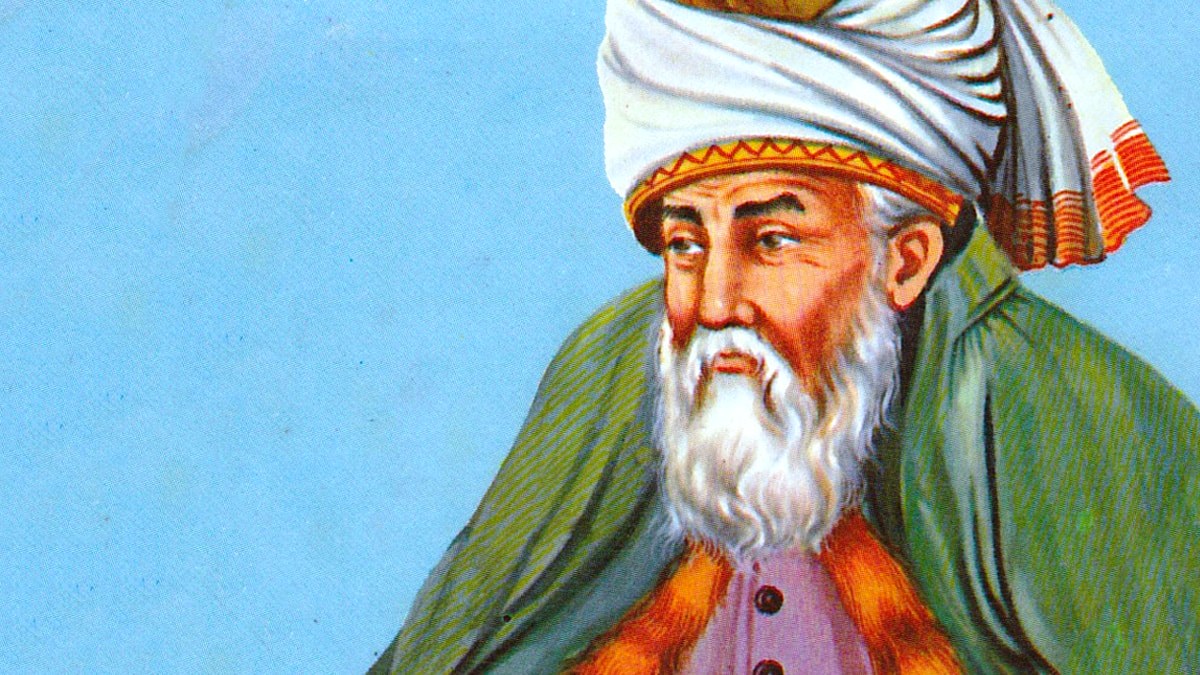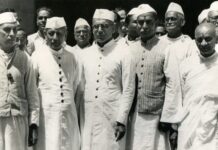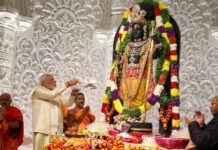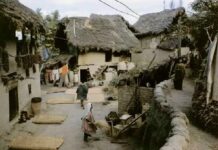Kashmir was always interesting and enigmatic. Charles Adolphus Murray, the 7th Earl of Dunmore was in Srinagar in May 1892, when it went up in flames. Read his firsthand account of the days and nights he spent in Srinagar

April 27, 1892: Received a visit to-day from Mahammad Afzun Khan, Governor of Kashmir. He seems a superior sort of man and speaks excellent English. After thanking him for his courtesy in sending a State official and boats, etc., to meet us at Baramulla, our conversation turned into a more serious channel, and I was initiated into the mysteries of Kashmir politics.
In the evening I went to see Trench, who is down with fever on board Kennard’s house-boat, which is more luxurious than many a bungalow. Trench gave me a Lhasa (Tibetan) dog – such a little beauty! I have named her Hlamo, which is Tibetan for goddess. At present, she is but a round ball of fluffy hair, with a most comical little face and the sweetest little tail imaginable, which curls right over her back. She is only two months old.
April 28th.—After a heavy gale of wind, that bid fair to level all the tents in the Munshi Bagh with the ground, the morning broke fair, and by noon the sun was very hot. About 2 PM we had a severe dust-storm, which, however, was mere child’s play to a Rawal Pindi one. The most absurd rumours regarding our expedition are flying about the bazaars here, and have come to the ears of some of my caravan people. One of my servants, whose real name is Fyza Bakhs, but who rejoices in the name of “Fireworks,” asked, with a very grave face, if it was true I was going to be away six years!
April 29th.— One of our tents was broken into last night, but nothing stolen. Reported the circumstance to Young Husband at the Residency, and he has ordered a guard to watch the tents at night. Cholera has broken out in the city.
May 1st.—The body of an English officer of Artillery, who died yesterday at Shadipur, was brought up to-day in his boat. Diphtheria is said to be the cause.
May 2nd.—As I was rummaging about this morning in a Parsee store-keeper’s shop, buying a few extra stores, I came across a large tin hermetically sealed, on which was a label entitled “Berkeley Cheese,” 8 lbs. I need hardly say I immediately became the proud possessor of it. I must surely write to Fitz Hardinge and tell him his cheeses have found their way even to this out of the way part of the world. It shall be reserved for some great occasion, such as the death of the first “Ovis Poli”
May 3rd.—Another funeral to-day, of another Artillery officer—Lieutenant O’Leary, belonging to a mountain battery in Burmah. He came to Kashmir for his leave, took typhoid up the Sindh Valley and was brought in here more dead than alive. He never rallied but succumbed at once. None of the natives who brought him in knew who he was, and there was nothing to identify him, except his name on his leathern belt.
Serious strike in the food bazaar. The Bunniahs, having sole control of their own corn and rice for the first time, have agreed amongst themselves to lock it up and refuse to supply anyone, gentle or simple, in order to put the price up. Consequently, all our men and horses are starving. Young Husband and I went down to interview the Governor on the subject, and a store will be started tomorrow, where provisions for men, and grain for horses, can be procured at the old prices. Met Prince Galitzin, who says he will be off tomorrow, as he has thirty horses standing here, and he can get no barley for them.
May 5th.—Sempill, of the Seaforth Highlanders, was brought in today, having been badly mauled by a black bear on the Pir-Panjal. He told me he was just getting to the top of a ridge when he heard a low growl as it were close to him, so, seizing his rifle from the hands of his shikari, he ran up to the crest of the ridge, and, as the bear happened to be doing likewise, they met literally face to face on the top within four yards of each other. Sempill had just time to fire, when the bear sprang on him, and knocking him down, fell on the top of him, and they both rolled down the precipice together; Sempill fell backwards, making two revolutions, head downwards, the bear meanwhile holding on to his head with one paw, while the claws of the other were firmly embedded in his left cheek, just below the eye. When they reached the bottom of the Khud, and Sempill came to, the bear was lying stone dead along-side of him. It was a narrow escape, and he got off very, cheap, having no bones broken and merely these two flesh wounds.
May 7th.—A disastrous fire broke out last night in the city, raging all night, on the right bank of the river. From our camp the flames of the burning city were so very distinctly visible that we thought at first it must be the Residency burning, so close did the fire appear to us. The whole sky, for miles round, was lit up with a lurid glare, and as it was blowing a gale at the time, we could see the flames rushing on before the wind as they ruthlessly licked up everything in ‘their path of destruction. We went down early in a boat this morning, as the fire was raging as furiously as ever, there being no means in the city for extinguishing it.

A more piteous sight I never before witnessed, or such wholesale destruction, the city being built almost entirely of wood. The second bridge was burnt right through, thus cutting off from the poor people in the burning quarter all chance of escape except by boat. For a considerable distance between the second and third bridges, there was not the vestige of a house left standing; nought but a heap of smouldering ruins, including one Hindu temple and a Mahammadan mosque. Just opposite the finest Hindu temple in the city, the gale drove the flames over the river till they reached the outworks of this sacred edifice, which were burnt to the ground. They managed to save all the main body of the temple, whose beautiful silvery looking roofs, with their gilded cupolas, escaped unhurt. The house, in which Young Husband and I had interviewed the Governor, two or three days ago, was also burnt.
But the scenes enacted on the banks of the river were the most painful. The population seemed to have gone mad. Big strong men raving and being held down by their friends or relatives. “Women shrieking and screaming, as only a Kashmiri woman can, wringing their hands and gesticulating wildly at the fire; crowds upon crowds of men, women and children surging to and fro, one huge helpless affrighted mass, on the landing-steps all down the river; while others seemed so paralyzed with the great ruin that had so suddenly overtaken them, that they had relapsed into a sort of comatose state of apathetic indifference.
The whole scene was not lacking in grandeur, although, like everything else, it had its grotesque side as well as its tragic. For instance, I saw one man, whose house was blazing over his head, calmly sitting at his open window pouring water on to some burning wood beneath him out of a teacup.
But the grandeur of the whole scene was enhanced by the breaking of a terrific thunderstorm over the devoted city, just at the same time as Colonel Neville Chamberlain brought up his big guns, and put them into position, to bombard a certain part of the city, with a view to making a clean breach between the burning houses and those as yet untouched, thus preventing the fire from spreading, otherwise the whole city must have been burnt to the ground. The storm now turned to a deluge of rain, yet it seemed to have no effect upon the fire, except to raise great columns of black smoke which were blown hither and thither, the sport of the gale. I shall never forget the lurid look of the flames in the daylight, against that leaden sky, and the bursting of the thunder-claps, the glare of the forked lightning, the roar of Heaven’s artillery contrasting with the puny noise of Chamberlain’s terrestrial guns, as they belched forth their shot at the houses doomed to destruction, and in the intervals the shrill shrieks and cries of a half-maddened population.
However, everything must have an end, and by nightfall, the fire was to all intents and purposes kept under control so that all fear for the safety of the rest of the city was at an end. But it was no thanks to the people of the city that the fire was stopped. The natives did absolutely nothing. The fire was arrested, kept under, and eventually extinguished by Europeans, and mostly by Englishmen.
May 9th.—The damage done by the fire is computed at twenty lakhs of rupees, and 5000 houses, mosques and temples have been destroyed.
(The diary entries were excerpted from Lord Dunmore’s book The Pamirs – Being A Narrative of a year’s Expedition on Horseback and on foot Through Kashmir, Western Tibet, Chinese Tartary, and Russian Central Asia. The book was published a year later after the Lord’s return from a long journey that many think was for spying.)















